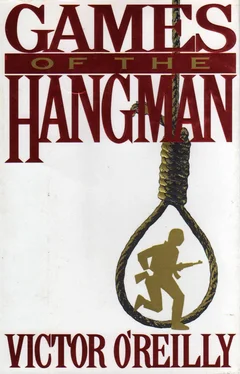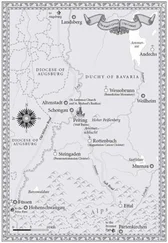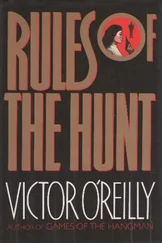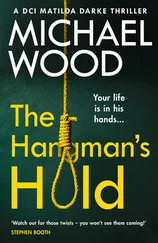Victor O'Reilly - Games of The Hangman
Здесь есть возможность читать онлайн «Victor O'Reilly - Games of The Hangman» весь текст электронной книги совершенно бесплатно (целиком полную версию без сокращений). В некоторых случаях можно слушать аудио, скачать через торрент в формате fb2 и присутствует краткое содержание. Жанр: Триллер, на английском языке. Описание произведения, (предисловие) а так же отзывы посетителей доступны на портале библиотеки ЛибКат.
- Название:Games of The Hangman
- Автор:
- Жанр:
- Год:неизвестен
- ISBN:нет данных
- Рейтинг книги:4 / 5. Голосов: 1
-
Избранное:Добавить в избранное
- Отзывы:
-
Ваша оценка:
- 80
- 1
- 2
- 3
- 4
- 5
Games of The Hangman: краткое содержание, описание и аннотация
Предлагаем к чтению аннотацию, описание, краткое содержание или предисловие (зависит от того, что написал сам автор книги «Games of The Hangman»). Если вы не нашли необходимую информацию о книге — напишите в комментариях, мы постараемся отыскать её.
Games of The Hangman — читать онлайн бесплатно полную книгу (весь текст) целиком
Ниже представлен текст книги, разбитый по страницам. Система сохранения места последней прочитанной страницы, позволяет с удобством читать онлайн бесплатно книгу «Games of The Hangman», без необходимости каждый раз заново искать на чём Вы остановились. Поставьте закладку, и сможете в любой момент перейти на страницу, на которой закончили чтение.
Интервал:
Закладка:
There had at first been some resentment at Fitzduane's decision to kept them unarmed and away from the firing line, but the logic of his reasoning soon won out. They had to face the unpalatable fact that the initial threat had come from their own student body – and there was not guarantee that one or two or more Sacrificers might not be left. The discussion of how to resolve this dilemma had begin enthusiastically but not very productively. Things changed when the Swede, Sig Bengtquist, a mathematician and a distant relative of the Nobel family, started to speak. Up to now he had been silent, but the notepad he seemed never to be without, even when dragged unwillingly into some sporting activity, was covered with neat jottings in his microscopic handwriting.
"There is no foolproof way of ensuring that we do not select a Sacrificer by accident," he said. "But I think we can establish some orderly criteria to improve our chances of choosing the right people."
"You've worked out a mathematical formula," said a voice.
"Yes," said another. "We're going to draw the lucky winners out of a hat or roll dice to see who gets a chance to be shot at."
There was strained laughter. They had decidedly mixed feelings about experiencing any further the lethal realities of combat. Some were terrified at the thought. Others were itching for a chance to hit back and be players and not merely pawns in this game of life and death. What they had seen earlier in the day – the slaughter in the college – had left them with no illusions about glory or the supposed glamour of war.
"Go on, Sig," said the deep baritone voice of Osman Ba, a Sudanese from the northern part of the country and the Swede's best friend. From the contrast in their coloring they were known as “Day and Night.” There were nods of agreement from the others. There were about fifty students in the room – representing half as many nationalities – and since there weren't enough chairs, most were sitting on boxes or on rugs on the floor. Empty sandwich plates and glasses were piled next to the door. Several of the students, worn out by the excitement of the day and the post-stress reaction, had fallen asleep. The others all looked tired, but what they were trying to do held their interest, and their eyes, though mostly red-rimmed from strain and fatigue, were keen and alert.
"I have drawn up a matrix," said Sig, "a spread sheet if you're accountancy-minded, cross-referencing all who have volunteered to fight with the criteria. As it happens, this approach produces sixteen names, so we still have to find some way to whittle down the list to the ten names we've been asked for. I would suggest nothing more scientific than reviewing the sixteen names and, after any objections, putting all the remaining ones into a hat and pulling out the first ten."
"Makes sense," said Osman Ba.
"What are these criteria?" asked one of the Mexicans. "I think it's only fair that we should know how these names have been selected."
"Of course," said Sig. "The points are mostly obvious. All additional suggestions are welcome." There was silence in the room before Sig spoke again. They could hear the sounds of gunfire and more explosions. The prospect of leaving their safe underground haven was looking less appealing by the minute.
"Not a member of the ski club," said Sig. "All the known Sacrificers were, you will recall."
"That lets me out," said a Polish student, "but it doesn't make me a Sacrificer."
"Eighteen or over," continued Sig, "familiar with weapons, good health, and eyesight and no serious physical defects, good reflexes, good English – that seems to be the common language among the existing defenders. Not an only child." The list went on for another dozen points. "And someone we all instinctively trust. Gut feel," he added.
He read out the sixteen names. Three were vetoed. At Sig's suggestion, no reasons were given. The remaining thirteen names were placed in the now-empty bread bin. Three minutes later the chosen ten looked at each other in the knowledge that before dawn one or some or all of them might be wounded, even dead.
Sig was elected leader of the volunteers.
"Why only ten of us, I wonder?" asked Osman Ba. "They could have asked for more. Why not twelve like the apostles?"
"One of the twelve was a traitor," said Sig. "I guess Fitzduane is trying to improve the odds." He was reflecting that his little group was about as multinational as it could be. Would it help that traditional enemies – Russian and Pole, Kuwaiti and Israeli, French and German among them – were now on the same side? Did it make any difference what nationality you were when you were dead?
His mouth was dry, and he swallowed. Osman was doing the same thing, he noticed. That made him feel marginally better.
Above Fitzduane's Castle – 2307 hours
"Quite a party," said Kilmara into his helmet microphone.
"About bloody time," answered Fitzduane. The signal strength was good, and though his tone was professionally neutral, the relief in his voice was palpable. "I hope you've brought some friends. The Hangman is here in strength."
"Situation report," said Kilmara.
Fitzduane told him, his summary succinct and almost academic, detailing nothing of the fear and pain and the gut-churning tension of combat.
"Can you hold?" asked Kilmara. "I'll have to locate my DZ well north of you or the 12.7s won't leave much of us. It could take an hour or longer to link up with you."
"We'll hold," said Fitzduane, "but it's getting hairy. We don't have enough bodies to man the full perimeter properly. We may have to fall back to the keep."
"Very well," said Kilmara. A heat signature blossomed on the IR-18 screen. Reflexes already primed, virtually simultaneously the pilot punched a switch to ripple-fire flares and, banking away from the oncoming missile, put the Optica into a series of violent maneuvers culminating in a steep dive.
"A fucking SAM," said the pilot seconds later when it was clear that the heat-seeking missile had been successfully decoyed by the intense heat of the flares. "Who would have thought it? A heat-seeking SAM-7 at a guess. Good thing we got away or we'd be fireworks."
"Brace yourself for more fancy flying," said Kilmara. "We're going to have to keep their heads down during the jump." He broke off to bark instructions to the two Ranger transport aircraft, which were preparing for a run to the drop zone. In response, the lead plane peeled off to starboard, leaving the second Islander alone heading toward the DZ. It was out of range of the heavy machine guns, but a SAM-7, what the Russians called a Strela or “Arrow” – has a range of up to 4,500 meters, depending on the model, and the slow Islander, low and steady for the drop, would be a tempting target. A possible tactic was to fly very low because a SAM-7 isn't at its best below 150 meters, but there was the small matter of allowing the parachutes time to open. In addition, budget constraints had meant that automatic flare dispensers weren't fitted to the transports, though conventional Very pistols were carried and might be of some help.
Kilmara raised Fitzduane again for a brief discussion of tactics and the disposition of the Hangman's forces. The primary targets would be the missile position and the heavy-machine-gun emplacements. The other threats would have to wait.
Unfortunately they wouldn't. As the Optica prepared for its strafing run and the Ranger transport flew toward the DZ, the Hangman launched another attack on the castle, with the tank spearheading the thrust.
Fitzduane's Castle – 2318 hours
The tank was advancing very slowly. The weight of its armor alone was unlikely to account for its pace, nor would there be any tactical reason for advancing at a crawl, so either the machine wasn't working properly or there were more unpleasant surprises in store.
Читать дальшеИнтервал:
Закладка:
Похожие книги на «Games of The Hangman»
Представляем Вашему вниманию похожие книги на «Games of The Hangman» списком для выбора. Мы отобрали схожую по названию и смыслу литературу в надежде предоставить читателям больше вариантов отыскать новые, интересные, ещё непрочитанные произведения.
Обсуждение, отзывы о книге «Games of The Hangman» и просто собственные мнения читателей. Оставьте ваши комментарии, напишите, что Вы думаете о произведении, его смысле или главных героях. Укажите что конкретно понравилось, а что нет, и почему Вы так считаете.











